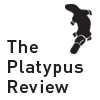A panel event held at the Inaugural European Conference of the Platypus Affiliated Society on July 18th, 2014 at Goldsmiths College, London.
At this panel event, Platypus members Lucy Parker (London); Jan Schroeder (Frankfurt); and Nikos Manousakis (Thessaloniki) reflected upon the below questions. This was followed by an open audience Q&A.
What have been some of the more significant engagements in your chapter with the Left? Why was this important for the development of your chapter and, what has this engagement taught us about the nature international Left?
What are some challenges in building your local chapter, what is the landscape of the Left that makes it hard to navigate, etc?
Why Platypus? Why does platypus need to exist in your location aside from you being there?What are the recurring points of discussions within your chapter? Do you feel like your chapter differs from the international discussions if so how?
This is an international conference, in what way do you see yourself as part of an international organization and how do you see Platypus as an international project? What do you see as the growing trends in the Left in the next year or two? How might Platypus be positioned to address these? Should it?
Where do you want Platypus to go? What other kind of engagements do you hope to foster in the future with the help of other international chapters?
A panel event held at New York University on April 18th, 2013.
Transcripted in Platypus Review #57 (Click on banner to see):

Recently, a series of exchanges between the Communist Party of Great Britain (PCC), the International Bolshevik Tendency, and the Platypus Affiliated Society has unfolded, mapping a field of positions and historical perspectives whose contours trace some of the most provocative contemporary perspectives on Marxism, socialism, and democracy.
With this public forum speakers will take stock of the points of convergence and divergence that have emerged in order to push the conversation further on key issues such as Left unity, neo-Kautskyism, factionalism, Trotskyism, sectarianism, Leninism and Bolshevism, democratic organization and political program. The event will feature:
James Turley (CPGB)
Bhaskar Sunkara (Jacobin)
Benjamin Blumberg (Platypus)
Please see the link below for a helpful compilation of debates between the Communist Party of Great Britain (PCC), the International Bolshevik Tendency, and the Platypus Affiliated Society.
The full compilation may be found here.
A panel held on April 6, 2013, at the 2013 Platypus International Convention at the School of the Art Institute of Chicago.
Transcribed in Platypus Review #59 (Click below to see):
Ten years on from the US invasion of Iraq, are we any closer to understanding what Imperialism is and why we are against it? The problem of Imperialism seems to be getting more difficult to clarify, in relation to our present moment. Since the euphoria around the Arab Spring has passed, the Left has had mixed responses to the interventionist foreign policy of the US, UK and France in the Middle East and North Africa.
It is difficult to disentangle and to clarify what relation the Left’s responses to current issues in Libya, Mali and Syria bear to the history of anti-Imperialism. Never-the-less, if we are to ever overcome Imperialism, we must also confront the history of the Left’s attempts to overcome it.
Just over thirty years ago, the Falklands war presented problems for the Left, in terms of being, on the one hand, against imperialism of British intervention, on the other hand, against a brutal military dictatorship in Argentina. Anti-fascism and anti-imperialism have not always been in ideological conflict on the Left. But, it could be argued, that they have increasingly become so. If this is the case, it might suggest a changing character of anti-Imperialism during the history of the 20th Century. Looking further back, to WW1, what did Marxists understand by the term Imperialism? Does being anti-Imperialist, today even mean to be anti-Capitalist? Does being anti-Capitalist, mean to be anti-Imperialist?
In asking ‘What is Imperialism and for what reasons are you against it?’ this panel is also attempting to address ‘What does it mean to be Marxist, and what does it mean to be on the Left, today?’ It is also to ask, what has become of the Left, and conversely, what could it become?
Speakers:
Larry Everest (Revolutionary Communist Party)
Joseph Green (Communist Voice)
James Turley (Communist Party of Great Britain)
"Why I joined Platypus" was the Sunday Plenary panel at the Platypus Affiliated Society's 4th Annual International Convention, held at the School of the Art Institute of Chicago, March 30 to April 1, 2012. In this panel four members reflect on why they joined Platypus, and what this decision has meant for them. This panel took place on April 1st, 2012, at the School of the Art Institute of Chicago.
Speakers:
Chris Cutrone
Thodoris Velissaris
Benjamin Landau-Beispiel
Douglas La Rocca
Electoral politics are a longstanding problem for the U.S. left. In recent decades, a number of parties have formed as an alternative to the Democratic Party: the Labor Party, the Green Party, and now, the Justice Party. However, these parties risk becoming little more than networks of activists or pressure groups on the Democratic Party, and it still remains unclear whether a serious electoral challenge to the Democratic Party is possible. Radical Minds is pleased to air an edited recording of a panel organized by the Platypus Affiliated Society, which investigates several contemporary approaches to electoral politics and draws out the theories that motivate Leftist third parties. The major speakers, Lenny Brody of the Justice Party and Jason Wright of the International Bolshevik Tendency, consider how the historical achievements and failures of third parties bear upon the present.
Aired on April 10th, 2012 on the Radical Minds radio show.


